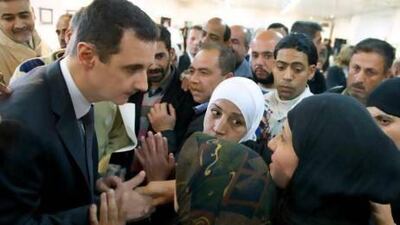The appointment of an interim prime minister by Syria's opposition may advance the rebels' quest to become more credible and effective, but it hardly solves the multitude of problems facing groups trying to topple the president, Bashar Al Assad.
As the opposition's newly chosen prime minister, Ghassan Hitto will form a government tasked with administering day-to-day affairs in the parts of Syria outside of regime control - the liberated zones in Idlib, Raqqa, Deir Ezzor and areas on the outskirts of the capital, Damascus, where Mr Al Assad's regime has been stripped away.
Mr Hitto's government - he is currently deciding whom to propose as his ministers - will provide humanitarian aid supplies, coordinate the work of local peoples' ad hoc municipal councils and attempt to organise an embryonic and disjointed, but expanding, network of opposition-run police forces and law courts.
If, against considerable odds, he is successful in delivering, the opposition will have gone a long way to proving its relevance and competence to ordinary Syrians who, regardless of their political affiliation, want to see the basic services restored
This would be a vital achievement for Mr Al Assad's opponents, who remain widely criticised as distant, divided and self-interested.
Boosting Mr Hitto's chances of success is that his government will be able to focus on the job in hand, unburdened by the machinations of foreign diplomacy or the headache of waging a ground war via a host of fractured and unruly rebel groups.
Foreign policy and responsibility for the armed rebel groups are set to remain in the hands of the wider Syrian National Coalition, headed by Moaz Al Khatib - in effect a president for the opposition working alongside Mr Hitto, the prime minister.
There is, however, a flip side to the opportunity Mr Hitto's appointment represents, with risks lurking in the shadows.
If he fails to rapidly deliver competent administration on the ground inside rebel held areas, it could further erode already flagging support for the uprising among ordinary civilians, reinforcing their view of the opposition leadership as being at best a waste of space and, at worst, a mirror image of Mr Al Assad's regime: corrupt, inefficient and self-serving.
The danger of this happening is very real, with senior opposition figures, among them Mr Al Khatib, reluctant to name an interim government until they could be certain on its ability to provide.
There are further reasons why Mr Hitto taking over as the opposition's interim prime minister may prove problematic.
He is considered a moderate Islamist and, while independent of party affiliations, according to opposition activists he has historical links to the Muslim Brotherhood from his days as a student in Damascus.
Those links were apparently crucial in gaining him the support needed to be chosen as prime minister - 35 of 49 votes among opposition delegates - but they were also a key reason some opposition figures, including the powerful Syrian National Council, refused to back him.
Competing against Mr Hitto, the SNC offered up its own candidate, Assad Mustafa, a former Syrian government minister and, like Mr Hitto, a technocrat but with a crucial difference: he is a secular leftist.
"The reality is that most of the opposition on the ground, certainly the armed groups, are Islamists so it was agreed that there was no way they would follow a secular man," said a well-connected opposition activist familiar with the election process.
Just as it remains to be seen if Mr Hitto will be able to deliver competent governance inside a war zone, it is unclear if the new interim prime minister will act as a unifying force within the opposition, able to mediate any contest between secular and Islamist trends.
Answers may emerge quickly, as Mr Hitto names his ministers. Will he get he mix right? Will he be able to balance the competing demands for position, power and influence within his own government? Will public squabbling further erode the already dubious standing of the opposition in the eyes of the Syrian public?
With luck and skill, Mr Hitto may play a key role in melding the opposition into a real government-in-waiting, and a truly credible alternative to the discredited Assad regime.
Should he fail, however, it will be a major setback to the opposition and may make worsen already deep divisions within rebel ranks, especially those between Islamists and secularists.
twitter: For breaking news from the Gulf, the Middle East and around the globe follow The National World. Follow us

